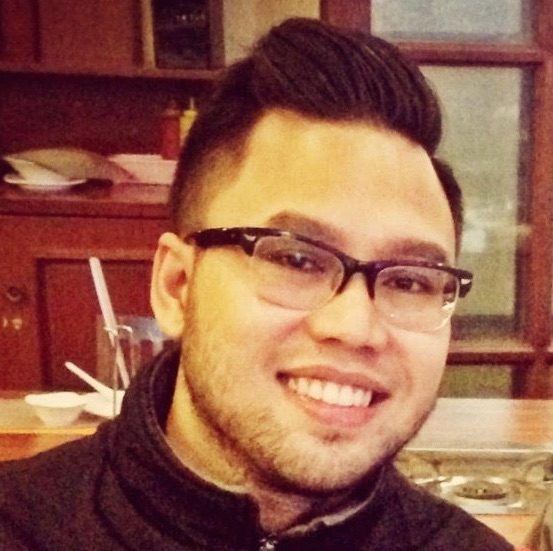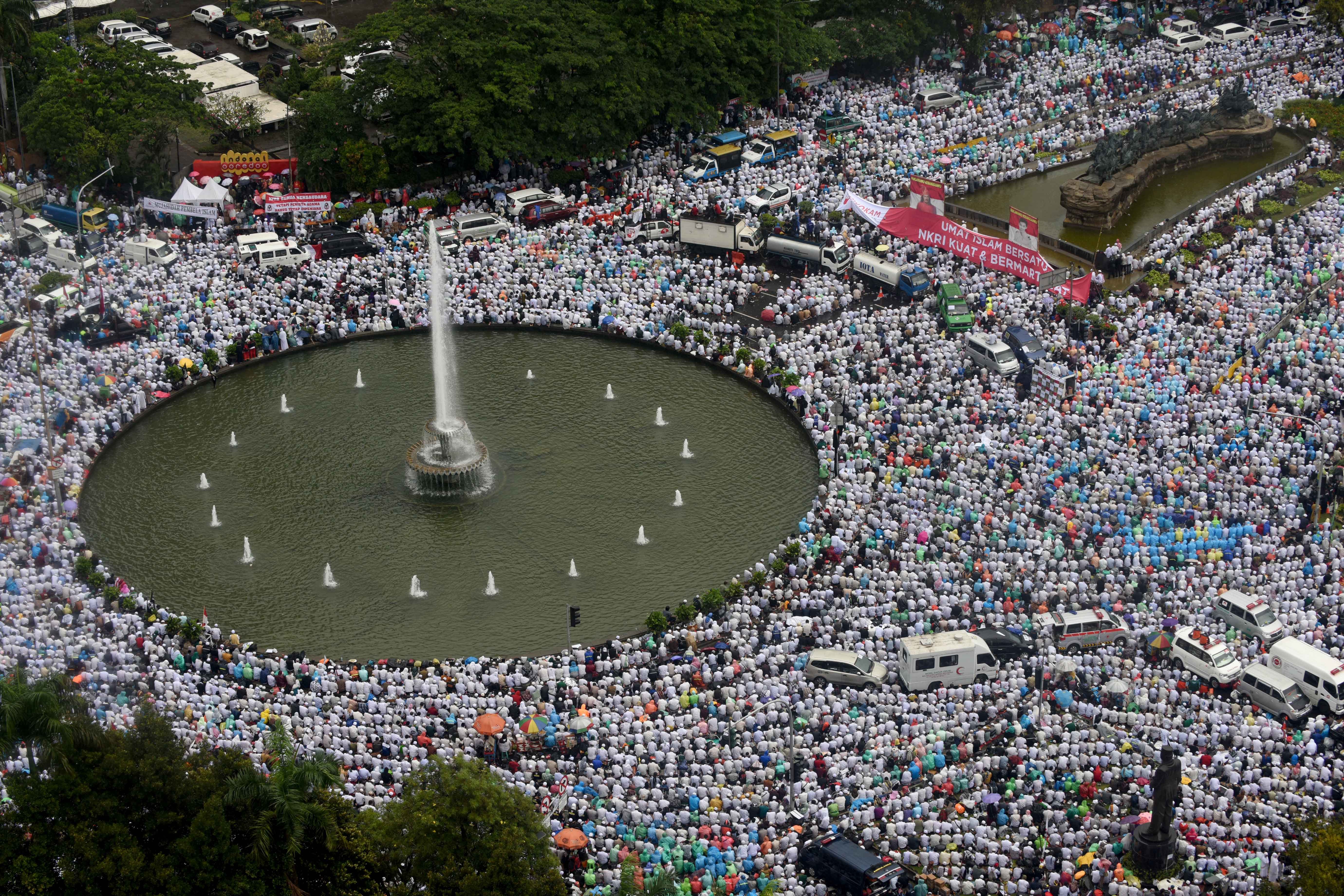SUMMARY
This is AI generated summarization, which may have errors. For context, always refer to the full article.

Three mass rallies have now been conducted protesting Jakarta Governor Basuki Tjahaja Purnama, also known as Ahok, for alleged blasphemy. Despite advice from the government and the police not to participate, thousands of Muslim worshipers joined a mass Friday prayer on December 2 to put more pressure on the government to detain Ahok, who has been named a suspect.
Despite fears of violence, the demonstration turned out to be a peaceful one, despite of course the repetitive anti-Ahok chants, attracting even more Muslims than the previous rallies.
To those of you who are wondering what’s going on, here’s my simple explanation: The Indonesian conservatives are on the rise.
Now before we talk about what’s behind this so-called awakening of today’s conservatives in Indonesia, one should understand that this is a trend that’s happening in many parts of the world. In the United States, for example, the conservatives are now claiming victory by gaining control over the White House, the Senate and the House.
American conservatives, roughly represented by white people who live in small cities and rural areas, were the ones who ensured Donald Trump’s shocking triumph over Hillary Clinton in this year’s presidential election. They chose to ignore or forgive his inappropriate comments – like when he mocked a disabled journalist during the campaign – because they think President-elect Trump has the courage and capabilities to turn down pro-globalization policies. This includes of course, policies on trade and illegal immigration, in hopes of boosting the economy and bringing back manufacturing jobs to eventually “make America great again.”
Sparked by the refugee crisis and the ongoing economic slowdown, conservatives are also gaining ground in Europe, after years of domination by the liberals. After the Brexit camp’s victory in the United Kingdom in June, other countries in Europe, such as Germany, France, the Netherlands and Austria, are now witnessing how the right-wing political parties are getting more support from the voters.
Populism, a political doctrine that describes an anti-political establishment movement, might be a correct term to explain what’s developing in global political landscapes, as indeed used by many political pundits – but really it’s the conservative voters who are behind this unprecedented surge.
Conservative Muslims
You will see different types of conservatives all around the world. But there are those who are hostile to any change in traditional values, be it religious, cultural or social.
In Indonesia, it’s not easy to classify who are conservatives and who are not, since Indonesians have diverse religious and ethnic backgrounds. But while ethnically-based nationalism (as pointed out by The Economist in its recent article) is a major force behind radical political changes in various countries, in Indonesia, the rise of conservatism, in my opinion, is based on uneasiness of Muslims – encompassing various ethnic differences – who have realized their political bargaining power as the majority.
There are two possible explanations to understanding the reaction of many Indonesian Muslims toward Ahok’s blasphemy case. The first explanation is a simple, straightforward one. In spite of Ahok’s seeming success in managing the capital, his uncompromising style of leadership is despised by his critics, who like to label Ahok’s strict eviction policy as inhumane and un-Islamic.
To many conservative Muslims, Ahok is viewed as an arrogant leader who likes to mock others, says harsh and impolite comments in public, and oppresses the have-nots, specifically poor Muslims. All of that is intensified by the belief that Muslims should never be led by a non-Muslim leader, one upheld by the most conservative Muslims.

The second explanation requires a much deeper examination, in that there’s ongoing economic and social anxiety experienced by conservative Muslims all over the country. Like conservative anxiety in Western society, Indonesian conservative Muslims are disappointed with how things are going in their country. Like their counterparts in many other countries, conservative Muslims in moderate Indonesia see themselves as an irony. They feel as if they’re being treated like the minority.
Together they’ve realized that there’s an economic anomaly in Indonesia, where economic policies and programs are issued only to benefit a few groups. To those aware of statistics and data, this argument is of course somewhat valid; there’s a glaring economic gap in this country, whereas the rich are getting richer while the poorer are finding it harder to get jobs.
That said, it’s no surprise that the Jakarta government’s controversial reclamation plan in Jakarta Bay, among others, has been effectively used as jargon by many to justify their claim that many of Ahok’s policies and programs are only designed to benefit big corporations and the rich.
At the same time, these conservative Muslims are feeling embarrassed by the government’s inability to counter the penetration of so-called liberal values, such as the LGBT movement which was gaining more acceptance in Indonesia’s urban society.
Trigger
The Ahok religious defamation case was basically a trigger to many other deeper issues felt by a large number of Muslims throughout the nation. Ahok’s case has given them a stage, sort of a comeback, after a big loss in the 2014 presidential election, in which most conservative Muslims gave their support to Prabowo Subianto.
What’s interesting is how this movement has been made possible with the help of social media – which is ironic since information technology advancements were partly created by progressives who believe in the power of freedom of speech.
Largely denounced by mainstream media, conservative Muslims found a perfect sanctuary in Facebook, Twitter and Youtube, which allow them to spread their messages and beliefs for free without mediators or brokers. The same thing occurred in the previous US election. It wasn’t CNN or even FOX News that became Trump’s main communication tool, but Twitter, the 140-character social media platform, that he so enthusiastically used to build an effective engagement with his followers.
What we all need to understand is that while the national motto “Bhinneka Tunggal Ika” (“Unity in Diversity”) is worth repeating and realizing, people hold different beliefs and it’s only natural that they will do whatever it takes to fight for their values.
Prompted by many things, such as the instability of the global economy, today’s political spectrum has changed quite dramatically all over the world, including here in Indonesia. Whether you like it or not, the conservatives are staging a comeback, simply because they’ve understood that the only way to get themselves heard is to unite and be involved in politics. – Rappler.com
The writer is a communications and public affairs practitioner who is now working in the financial industry. The views expressed are his own.
Add a comment
How does this make you feel?
There are no comments yet. Add your comment to start the conversation.